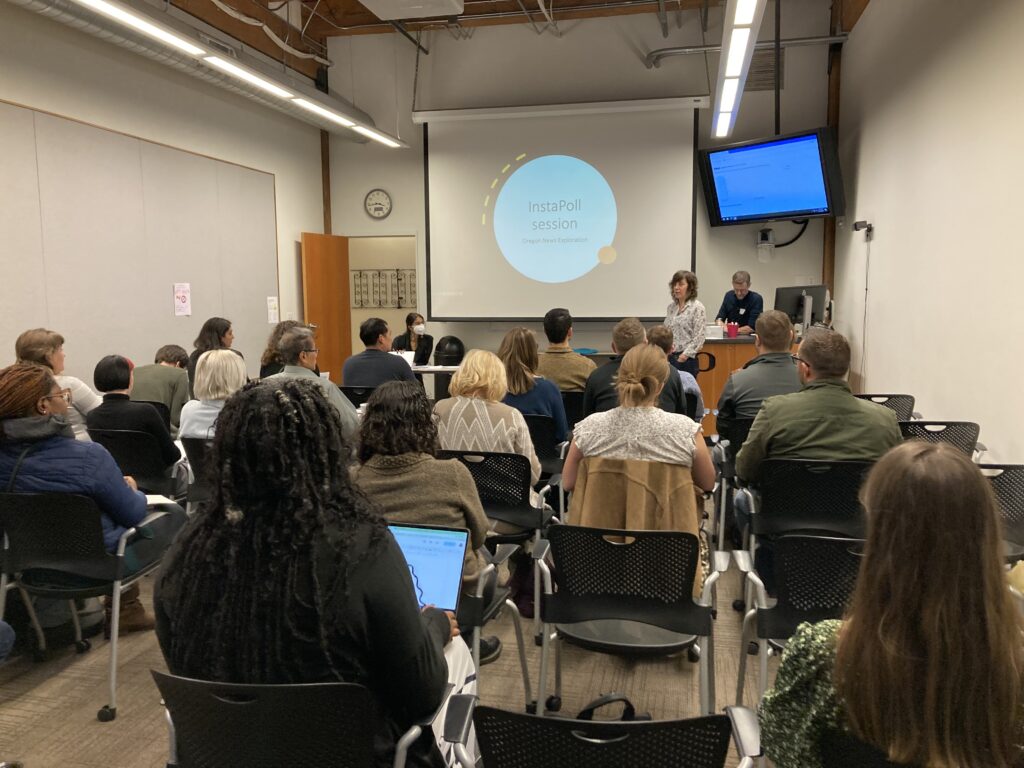When it comes to dealing with misinformation, different news organizations are trying different things, seeing what works. So at Oregon News Exploration, we wanted to learn whatever others were learning, and also understand what the role of journalism might be when it comes to the beating back of rumors, conjecture and lies.
In 2021, for example, when we asked Oregon journalists how often they encountered misinformation or disinformation, 82 percent said at least weekly, if not more often. (Fourteen percent said every hour!) But when we asked those journalists how they responded to misinformation and disinformation, they were divided, with no clear direction on best course with roughly equal numbers saying they ignored misinformation and disinformation completely, tried to debate it with facts, or tried to listen kindly and politely to whatever people tell them, no matter how ridiculous.
So earlier this year we spent a big chunk of time talking with experts and journalists outside of Oregon who had either researched or tried various forms of misinformation and disinformation disruption. The most helpful tactics came from newsrooms and organizations working abroad, many of whom deal with authoritarian governments and state-sponsored disinformation. Or more plainly: ham-fisted authorities who lie.
A key teaching from those folks: a lie is most useful to the person that tells it. So we looked very closely at specific tactics to monitor misinformation in breaking news, train reporters in advanced search and verification techniques, and researched how journalists can use a combination of both to deliver fact-based news.
We also analyzed a couple of significant misinformation events in Oregon—including, for example, some of the narratives around the Labor Day fires of 2020—to understand the dynamics of misinformation lift-off here. And we explored “misinformation inoculation” strategies, or approaches that derive from social science that tells us people are most receptive to the truth when it’s the first thing they hear.

Thanks to an invite from organizers at the Building a Better Journalist conference in October, hosted by the local chapters of the Society of Professional Journalists and the Asian American Journalists Association, we were able to circle back with Oregon journalists and show them examples of what these types of disruption strategies look like. And then we had a conversation about how working journalists might apply them here. Or if they really could.
Coming up with collaborative models that work against the tide of fiction and lies in Oregon is, after all, more than just popping a great idea out of a box. Oregon newsrooms are resource constrained, vastly different from one another, and spread out over diverse landscapes, both culturally and geographically.
Our discussion drew a couple dozen journalists and newsroom staff. We showed them three different ways that journalists around the world had worked collaboratively to combat disinformation and misinformation. And we used InstaPoll, a live survey tool, to track their reactions and understand which strategies they thought were most deployable here. It was great feedback that helped us understand, not just what work methods journalists prefer, but which they feel they can execute on the job right now.
We know from our statewide surveys and conversations in rural communities and communities of color that Oregonians are concerned about misinformation. Knowing that journalists are eager to work together to fight false narratives—and how they want to work together—is key as we design our collaborative newsroom.
Lee van der Voo
Lee van der Voo is an independent journalist based in Oregon who is known for aggressive accountability journalism. She has been involved in nonprofit news since 2010 and is the former managing director of the nonprofit newsroom InvestigateWest, for which she coordinated and managed collaborative news projects in Oregon. She launched the investigations desk at Civil Eats in 2021. Lee has authored two books and won significant national grants and awards, including from the Fund for Investigative Journalism, Investigative Reporters and Editors, and Society of Environmental Journalists. She received an Oregon Book Award in 2017 and has won or received special recognition for the Bruce Baer Award, Oregon’s top reporting prize, four times.
